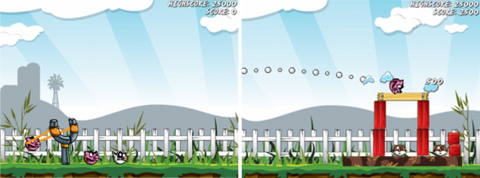Learning to Accept Failure
By emofratparty 5 Comments
(Originally published on Sumry.in's blog on June 1st, 2014. Read it here.)
Failure sucks.
Being unable to achieve something, even the slightest goal-oriented idea, can turn into a negative experience. From the minute we understand social hierarchy, it is implied that failing is a bad thing. And, for the most part, it is; it can be difficult to look at an effort that was seemingly made in vain and not take anything negative away from that. Failing can cause all sorts of problems for yourself and others, with consequences that range from being wholly visible to mostly unseen. But when we embrace the fact that failure is — in most cases — inevitable, it’s much easier to find success.
* * *
In relation to this topic, I recently spoke with a friend of mine who talked about “rewiring” his brain. Paraphrasing his words, he mentioned how he had been slogging through his daily routine, not really considering what made made him truly happy. Instead, he believed accomplishing whatever thing might be next up on his to-do list created that feeling. After doing a bit of thinking on how he could improve upon that, he was able to change the way he thought about his happiness.
During our email exchange, I mentioned how I’d experienced a similar issue last year but that I’d resolved it in a different way. My method was accepting failure.
Doing so is a crucial step in success because of how much you can learn from doing something wrong. Within that, however, you can do fail the right way and the wrong way. That may seem crazy at first, but think about it: have you ever missed out on accomplishing something? If so, why? Were you able to learn from that experience?
If there was no takeaway from the experience that caused your failure, then you failed incorrectly. There is always, always a lesson to be learned from what we do wrong.
* * *
The way I learned how to embrace “futility as change” is a result of the work I did last year. I was developing games, going to school, and creating a game development conference simultaneously. Over a 10 month period, I worked an average of 65 to 70 hours every week. The compounding responsibilities led to a huge increase in stress, affecting all of my projects and my personal life in some pretty awful ways.
In an effort to try and separate that world from a place I could try to heal my brain for a bit, I attended counseling sessions once a week for 14 weeks. Although it helped, it didn’t solve the root of the problem. I kept worrying about things that were beyond my control, in addition to what I could control, and it threw me into a hellish spiral. Even once everything had subsided, I still felt a sort of emptiness…I kept blaming myself for not executing things in a perfect fashion, and it nearly ruined me.
I told myself that I had to get out of the quicksand, so-to-speak. This began with reviewing back on the previous months and looking at what I had done — beyond the numerous false-starts and sometimes unmitigated disasters, there was a lot to be proud of. I helped release a game, finished my schooling, and hosted the event (which ended up putting me within hundreds of dollars of bankruptcy). None were completed in a manner I wanted, but that was ok. I’ve taken so many lessons away from the experience and know that, at the very least, I won’t make the same mistakes twice. Having that assurance has made and will continue to make my life much more positive moving forward.
Rather than being afraid to fail, I’ve learned to embrace it. Taking each lesson as its own future success, realizing that no matter what it will always be possible to recover again and improve based on those experiences.
You will never have success until you learn how to fail.
* * *
It is impossible to avoid mistakes, that much is certain, so here are some things to keep in mind:
1. Failure is inevitable.
Even in a minute sense, this is almost always true. Before you go into a project, be it personal or work-related, understand that something will not go the way you expect to. You don’t need to wait around in anticipation for what it may be, but just understand that it will happen. Doing so will alleviate a lot of stress at some point after the mistake is made; when, exactly, will be determined by your ability to accept it and move on.
2. Evaluate yourself and your work from your own perspective.
Each mistake carries with it its own weight, even though mistakes that affect you may not be your doing. Accidentally burning something on the grill probably doesn’t have the same gravity to it as, say, not landing a job. But believe it or not, there is some commonality between the two in that you are ultimately responsible for how you overcome the adversity attached to the event.
What did you do wrong? What can you have done better? Why do you think things didn’t go the way you wanted them to? These are all questions you should ask yourself (and record) when you believe you made a mistake.
In my case, I write post-mortems for all significant events in my life, successful or not. I keep most of them to myself for personal evaluation, but I wrote an extensive one for the aforementioned conference that you can read at this link. Reviewing yourself will help you be able to look back on your mistakes so that you may continue learning from them and relate them to current experiences. Just because something may have happened long ago doesn’t mean its value is lessened.
3. Learn from the mistakes of others.
No success story is without its ups-and-downs. Bill Gates’ first company tanked. Oprah Winfrey was fired from her first television job. James Dyson went through over 5,000 failed prototypes before delivering a successful line of products that are now used across the world.
The point is that there are other people who have made lots and lots of mistakes who have been able to turn them around, taking lessons from what went wrong and creating opportunity out of them. Even if you are just starting a career, there’s a good chance that someone else has already been in your footsteps. Just because the failure isn’t yours doesn’t mean you can’t learn from it.
4. Failure is an option.
Your first work won’t always be a success. Don’t be afraid to pursue something just because you don’t think it is feasible. If you fear that you are not going to be able to accomplish something, the likelihood that you will accomplish it is going to disintegrate. Embrace that fear and turn it into drive. If you can’t tackle obstacles that lie in-between you and success, and are unable to tolerate any missteps that may come with that process, you are going to have a hard time finding achievement.
* * *
Learn from the failures that come with life, take them under your wing, and use them to make yourself better. You won’t regret doing so.
As Michael Jordan once said, “I’ve failed over and over and over again in my life. And that is why I succeed.”











Log in to comment